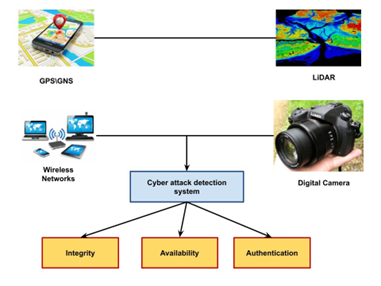Cyber-Attack Detection in Autonomous Vehicle Networks by Energy Aware Optimal Data Transmission with Game Fuzzy Q-Learning based Heuristic Routing Protocol
Main Article Content
Abstract
The automotive sector has seen a dramatic transition due to rapid technological advancement. Network connection has improved, enabling the transfer of the cars' technologies from being fully machine- to software-controlled. Controller area network (CAN) bus protocol manages network for autonomous vehicles. However, due to the intricacy of data and traffic patterns that facilitate unauthorised access to a can bus and many sorts of assaults, the autonomous vehicle network still has security flaws as well as vulnerabilities. This research proposes novel technique in cyber attack detection in autonomous vehicle networks enhanced data transmission based optimization and routing technique. Here the autonomous vehicle network optimal data transmission has been carried out using energy aware lagrangian multipliers based optimal data transmission. The cyber attack detection has been carried out using fuzzy q-learning based heuristic routing protocol. The experimental results has been carried out based on optimal data transmission and attack detection in terms of throughput of 95%, PDR of 94%, End-end delay of 46%, energy efficiency of 96%, network lifetime of 95%, attack detection rate of 88%.
Article Details

This work is licensed under a Creative Commons Attribution-NoDerivatives 4.0 International License.
References
He, Q., Meng, X., & Qu, R. (2020). Towards a severity assessment method for potential cyber attacks to connected and autonomous vehicles. Journal of advanced transportation, 2020.
Li, X. H., Hong, S. H., & Fang, K. L. (2009, September). A heuristic routing protocol for wireless sensor networks in home automation. In 2009 5th International Conference on Wireless Communications, Networking and Mobile Computing (pp. 1-8). IEEE.
Li, C., Wang, J., & Li, M. (2016). Data transmission optimization algorithm for network utility maximization in wireless sensor networks. International Journal of Distributed Sensor Networks, 12(9), 1550147716670646.
Uddin, F. (2017). Energy-aware optimal data aggregation in smart grid wireless communication networks. IEEE transactions on green communications and networking, 1(3), 358-371.
Lihua, L. (2022). Energy-Aware Intrusion Detection Model for Internet of Vehicles Using Machine Learning Methods. Wireless Communications and Mobile Computing, 2022.
Mahapatra, S. N., Singh, B. K., & Kumar, V. (2022). Secure energy aware routing protocol for trust management using enhanced Dempster Shafer evidence model in multi-hop UWAN. Wireless Networks, 1-18.
Ren, X., Vashisht, S., Aujla, G. S., & Zhang, P. (2022). Drone-edge coalesce for energy-aware and sustainable service delivery for smart city applications. Sustainable Cities and Society, 77, 103505.
Kumar, R., Tripathi, S., & Agrawal, R. (2022). Trust-based energy-aware routing using GEOSR protocol for Ad-Hoc sensor networks. Wireless Networks, 1-24.
Nandi, M., & Anusha, K. (2021). An Optimized and Hybrid Energy Aware Routing Model for Effective Detection of Flooding Attacks in a Manet Environment. Wireless Personal Communications, 1-19.
Khan, I. U., Hassan, M. A., Alshehri, M. D., Ikram, M. A., Alyamani, H. J., Alturki, R., & Hoang, V. T. (2021). Monitoring system-based flying IoT in public health and sports using ant-enabled energy-aware routing. Journal of Healthcare Engineering, 2021.
Geetha, B. T., Kumar, P. S., Bama, B. S., Neelakandan, S., Dutta, C., & Babu, D. V. (2022). Green energy aware and cluster based communication for future load prediction in IoT. Sustainable Energy Technologies and Assessments, 52, 102244.
Islam, M. J., Rahman, A., Kabir, S., Karim, M. R., Acharjee, U. K., Nasir, M. K., ... & Wu, S. (2021). Blockchain-SDN-Based Energy-Aware and Distributed Secure Architecture for IoT in Smart Cities. IEEE Internet of Things Journal, 9(5), 3850-3864.
Norouzi Shad, M., Maadani, M., &Nesari Moghadam, M. (2021). GAPSO-SVM: an IDSS-based energy-aware clustering routing algorithm for IoT perception layer. Wireless Personal Communications, 1-20.
Aloqaily, M., Al Ridhawi, I., &Guizani, M. (2021). Energy-aware blockchain and federated learning-supported vehicular networks. IEEE Transactions on Intelligent Transportation Systems.
Pérez, S., Arroba, P., & Moya, J. M. (2021). Energy-conscious optimization of Edge Computing through Deep Reinforcement Learning and two-phase immersion cooling. Future Generation Computer Systems, 125, 891-907.
Lakshmanna, K., Subramani, N., Alotaibi, Y., Alghamdi, S., Khalafand, O. I., & Nanda, A. K. (2022). Improved Metaheuristic-Driven Energy-Aware Cluster-Based Routing Scheme for IoT-Assisted Wireless Sensor Networks. Sustainability, 14(13), 7712.
Li, X. R., & Jiang, H. (2021). Energy-Aware Healthcare System for Wireless Body Region Networks in IoT Environment Using the Whale Optimization Algorithm. Wireless Personal Communications, 1-17.
Sadrishojaei, M., Jafari Navimipour, N., Reshadi, M., Hosseinzadeh, M., &Unal, M. (2022). An energy-aware clustering method in the IoT using a swarm-based algorithm. Wireless Networks, 28(1), 125-136.
Ali, E. S., Hasan, M. K., Hassan, R., Saeed, R. A., Hassan, M. B., Islam, S., ... &Bevinakoppa, S. (2021). Machine learning technologies for secure vehicular communication in internet of vehicles: recent advances and applications. Security and Communication Networks, 2021.
Li, L., Qiu, Y., & Xu, J. (2022, April). A K-Means Clustered Routing Algorithm with Location and Energy Awareness for Underwater Wireless Sensor Networks. In Photonics (Vol. 9, No. 5, p. 282). MDPI.

